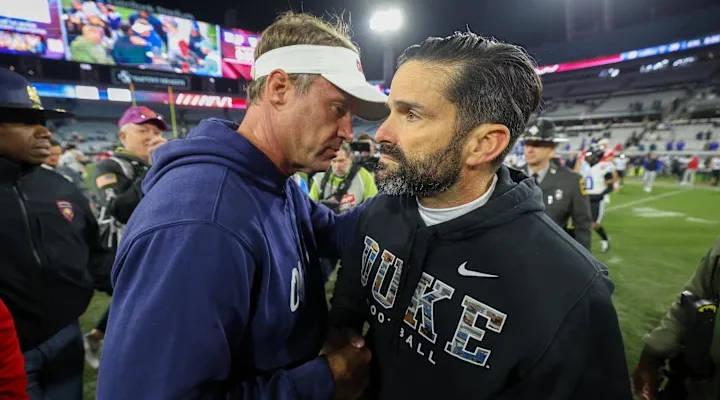Duke Football finds itself at a unique crossroads in the ever-changing landscape of college football, and head coach Manny Diaz is embracing the opportunities this new era presents. Over the past decade, college football has undergone seismic shifts, from the proliferation of the transfer portal to the impact of name, image, and likeness (NIL) deals, and now, with the continued expansion of playoff systems and conference realignments, programs of all sizes are facing unprecedented opportunities and challenges. For Duke, traditionally seen as a blue-blood academic institution with a football program that has struggled to consistently compete at the highest level in the ACC, this shifting landscape may offer a chance to redefine its football identity, attract top-tier talent, and elevate its program to a level few could have imagined just a few years ago. Manny Diaz, known for his defensive acumen and strategic approach to roster building, is acutely aware of these changes and has spoken candidly about how the Blue Devils can capitalize on them.
One of the most transformative developments in college football over recent years has been the rise of the transfer portal. Where once a player leaving a program might have been seen as a setback or even a failure, the portal now allows teams like Duke to actively target experienced players who can make an immediate impact. Manny Diaz has embraced this reality, viewing the portal not as a threat to roster continuity but as a tool to accelerate program growth. According to Diaz, the portal levels the playing field for programs like Duke that may not consistently land five-star recruits every year. Instead of relying solely on incoming high school classes, Diaz can supplement his roster with proven contributors from other programs, allowing him to address specific needs quickly. This strategic use of transfers can help Duke close the competitive gap against traditional ACC powerhouses, a concept Diaz has emphasized in interviews and press conferences.
Beyond the transfer portal, the NIL era has also significantly reshaped recruiting dynamics, offering schools like Duke a new way to appeal to top talent. While Duke may not have the same national brand recognition as some of the perennial football powerhouses, its academic prestige combined with a proactive NIL strategy can make it an attractive destination for players seeking both athletic and personal development opportunities. Manny Diaz has noted that many recruits today are looking beyond just football; they want to join programs that can enhance their personal brand, provide opportunities for professional growth, and support them both on and off the field. Duke, with its world-class academics and supportive athletic infrastructure, is uniquely positioned to offer exactly that. By strategically partnering with local and national brands, the program can provide meaningful NIL opportunities that rival those at more traditional football schools, creating a compelling incentive for top-tier athletes to consider the Blue Devils.
Conference realignment and playoff expansion also play a crucial role in shaping Duke’s potential in this new era. The ACC is evolving, and as more programs move between conferences or adjust their scheduling strategies, opportunities arise for teams like Duke to position themselves as consistent contenders. Manny Diaz has spoken about the importance of adapting to these structural changes, emphasizing that flexibility, strategic scheduling, and an eye toward playoff viability are critical for long-term success. For Duke, this could mean leveraging competitive windows, identifying games where the team can realistically secure marquee wins, and using those victories to boost recruiting and program visibility. In a landscape where perception can be nearly as important as performance, demonstrating that Duke can compete at a high level against quality opponents is key to establishing credibility on the national stage.
Moreover, Diaz has highlighted the growing importance of culture and player development in the modern college football ecosystem. With transfers and NIL deals changing how players approach their college careers, creating a program culture that emphasizes development, accountability, and opportunity becomes a competitive advantage. Duke’s football program under Diaz has focused on building a holistic environment that supports athletes academically, socially, and athletically. By fostering a culture where players feel valued and see clear pathways to both athletic success and personal growth, Diaz believes Duke can attract and retain talent in ways that purely financial incentives cannot. This emphasis on culture, combined with strategic roster management and intelligent use of new college football rules, forms the foundation of Diaz’s vision for the program.
Recruiting strategy itself has also evolved under Diaz, influenced directly by the changing landscape. Traditional recruiting models focused heavily on high school rankings and regional pipelines are being supplemented with a more nuanced approach that considers fit, character, and potential for growth. Diaz has stressed that finding players who align with Duke’s program culture and academic environment is just as important as evaluating athletic ability. This philosophy has guided the coaching staff in targeting recruits who may be overlooked by other programs but have the potential to thrive in Duke’s system. By pairing these players with targeted portal acquisitions and NIL opportunities, Diaz believes the program can assemble competitive rosters capable of sustaining success year after year.
Additionally, advancements in analytics and technology have provided programs like Duke with tools to maximize performance and gain a strategic edge. Manny Diaz has embraced data-driven approaches to game planning, player evaluation, and injury prevention. In an era where small margins can determine outcomes, leveraging these technological tools allows Duke to punch above its weight against more historically dominant programs. By combining traditional coaching methods with cutting-edge analytics, Diaz is positioning the Blue Devils to compete not only with ACC rivals but also on a national stage, a vision that was much harder to realize before the modern technological and regulatory changes reshaping college football.
One cannot overlook the impact of increased media exposure and changing fan engagement patterns on Duke’s trajectory. With streaming platforms and social media amplifying access to college football content, programs like Duke can reach a broader audience than ever before. Manny Diaz has commented on the importance of cultivating a strong brand presence, noting that visibility can directly influence recruiting, fan support, and program prestige. By engaging with media and leveraging storytelling around the team’s culture, academic excellence, and on-field achievements, Duke can enhance its reputation and attract attention that was previously reserved for programs with long-standing football traditions. In this sense, the evolving media landscape complements Diaz’s holistic approach to building a modern, competitive program.
Furthermore, the emphasis on player health and safety has grown dramatically in recent years, and Duke has been proactive in aligning with these best practices. Diaz has prioritized strength and conditioning, nutrition, mental health support, and injury prevention programs, understanding that a healthy, well-supported roster is essential for sustained success. In a competitive ACC environment where depth and durability can determine outcomes, Duke’s commitment to comprehensive player care not only improves performance but also enhances the program’s appeal to recruits and their families. It sends a message that the program values long-term development over short-term gains, reinforcing Diaz’s broader vision for the Blue Devils.
As college football continues to evolve, Manny Diaz recognizes that adaptability and innovation will be key to Duke’s success. He frequently underscores the need for the program to remain agile, whether that means adjusting game strategies, leveraging portal opportunities, capitalizing on NIL initiatives, or refining recruiting tactics. This forward-thinking approach is emblematic of a coach who sees beyond traditional limitations and understands that the modern football landscape rewards creativity, intelligence, and strategic foresight. By embracing these principles, Diaz believes Duke can not only compete but thrive, potentially redefining what it means to be a successful program in the ACC and on the national stage.
In conclusion, the new college football landscape, marked by the transfer portal, NIL deals, playoff expansion, conference realignments, technological advancements, and evolving fan engagement, presents both challenges and unprecedented opportunities for programs like Duke. Manny Diaz’s approach reflects a nuanced understanding of these changes, focusing on strategic roster management, holistic player development, cultural alignment, and proactive engagement with the broader football ecosystem. Through intelligent use of the portal, targeted NIL initiatives, data-driven performance strategies, and an emphasis on building a resilient, adaptive program culture, Diaz is positioning Duke to thrive in an era where traditional hierarchies are no longer fixed. While Duke may have historically been seen as an academic powerhouse first and a football program second, the current landscape offers a chance to rewrite that narrative. Under Manny Diaz’s leadership, the Blue Devils are not merely reacting to change—they are proactively leveraging it, demonstrating that thoughtful strategy, innovation, and cultural integrity can enable a program to punch well above its historical weight, compete consistently in the ACC, and emerge as a model for success in modern college football. In every sense, Duke stands poised to capitalize on the evolving landscape, signaling a bright and competitive future for the Blue Devils under Diaz’s guidance.



